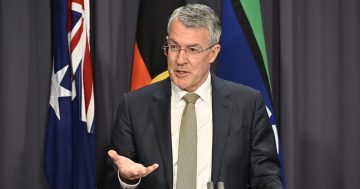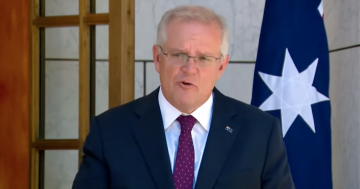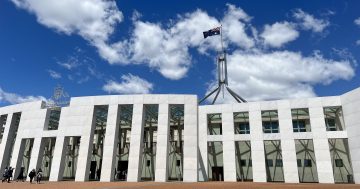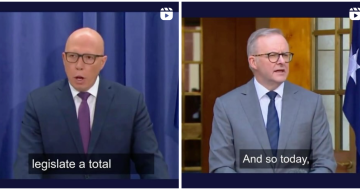Even if the electoral success of Thailand’s Move Forward Party does not end in control of Parliament, Pavin Chachavalpongpun says the people have spoken, and their voice will be hard to stifle.
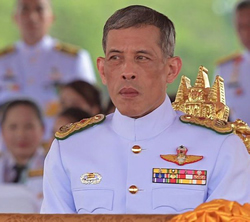 Thailand held a General Election on 14 May following almost a decade of politics being dominated by the military. The result was startling.
Thailand held a General Election on 14 May following almost a decade of politics being dominated by the military. The result was startling.
The progressive Move Forward Party won the majority of the votes, not only threatening the existence of the military in politics, but also breaking the electoral domination of the Pheu Thai Party which had won every election since 2001.
Three years ago, the Future Forward Party, the predecessor of the Move Forward Party, was dissolved by the Constitutional Court on the ground that it was loaned $US6 million ($A9 million) by its leader, Thanathorn Juangrungruangkit, which violated election laws regarding donations to political parties.
The Future Forward Party was targeted due to its program to demilitarise politics, and more importantly, to initiate reform of the monarchy and the draconian lèse-majesté law.
Lèse-majesté is a crime of disrespect to royalty punishable by three-to-15 years in prison.
The public’s overwhelming support for the Move Forward Party this time round must be interpreted in the context of the ever more open debate about the role of the military and monarchy in politics in recent years.
In 2020, students took to the streets of Bangkok calling for immediate reform of the monarchy. These protests spread rapidly throughout Thailand.
This was the first time when the monarchy — normally a taboo subject in Thailand — was on the public agenda.
The electoral victory of the Move Forward Party represents a public mandate for the reforms of Thailand’s key institutions.
While tackling the problem of the military in politics is possible, the discussion of the monarchy has remained fiercely off-limits.
Since King Vajiralongkorn succeeded to the throne in 2016, he has increasingly intervened in politics.
He requested an amendment of the constitution to empower himself. He took over the super-rich Crown Property Bureau. He also transferred some military regiments to his direct command.
His political ambitions have become boundless.
Meanwhile, younger Thais have begun to question the role of the monarchy despite the lèse-majesté law.
Thai youths today possess a different set of ideas regarding legitimacy and political power which explains their demand of a more transparent monarchy.
The response by King Vajiralongkorn (pictured) to these ideas has been ruthless. Protest leaders have been arrested, and some charged with lèse-majesté.
Recently, a 15-year-old girl was imprisoned under the lèse-majesté laws.
While it remains to be seen what will happen to the Move Forward Party and whether its leader, Harvard-graduate, Pita Limjaroenrat, will become Prime Minister, a plot to counter the supposed threats to the monarchy has already thickened.
Attempts to disqualify Pita have quickly gained pace. He has been accused of holding shares in what seems to be a defunct media company, which his enemies say is against election laws.
If successful, Pita could be banned from politics and even imprisoned at the hands of the Constitutional Court.
The next hurdle will come with the decision of the Senate. Under the current constitution, written by the junta in the aftermath of the 2014 coup, the nomination of Prime Minister must be approved by more than half of the combined Upper and Lower Houses.
The Upper House, the Senate, consists of 250 junta-appointed members. With 500 members of the Lower House, Pita will need to secure more than 375 votes to become Prime Minister.
As the Senate and other opposing parties will not vote for him, this is unlikely.
Other tactics to eliminate Pita and his party include the possibility of a military coup.
Amid the uncertainty over the next phase of Thai politics, King Vajiralongkorn has been eerily quiet.
In the lead up to the previous elections in 2019, Vajiralongkorn issued a statement reminding Thai people to “support good people to rule this country”— a message interpreted as a disapproval of parties hostile toward the monarchy.
In 2023, Vajiralongkorn refrained from communicating directly with the public. One could argue that he has been aware of his falling popularity, particularly after the 2020 protests.
The electoral triumph of the Move Forward Party suggests he may be right.
Seven years after the death of the widely revered King Bhumibol, the monarchy has fallen into a crisis of its own making.
The succession of Vajiralongkorn has worsened the situation, owing to his own political agenda and his unwillingness to accept self-reforms.
The 2020 youth protests and the electoral triumph of the Move Forward Party have simply accelerated the decline of the monarchy in popular opinion.
Even if Pita and his party are to be deprived of legitimate power, there is nothing to guarantee the longevity of the centuries-old monarchy.
The taboo on the discussion of the monarchy’s future has been broken; the genie is out of the bottle it cannot be returned.
However there has been no sign that the monarchy and its supporting institutions will even consider some concessions of power.
Thais, and in particular young Thais, have set out their demands — they want to build a future, quite possibly without a corrupt royal institution.
* Pavin Chachavalpongpun is an Associate Professor at Kyoto University’s Centre for South-East Asian Studies.
This article first appeared on the Australian Outlook page of the Australian Institute of International Affairs.



